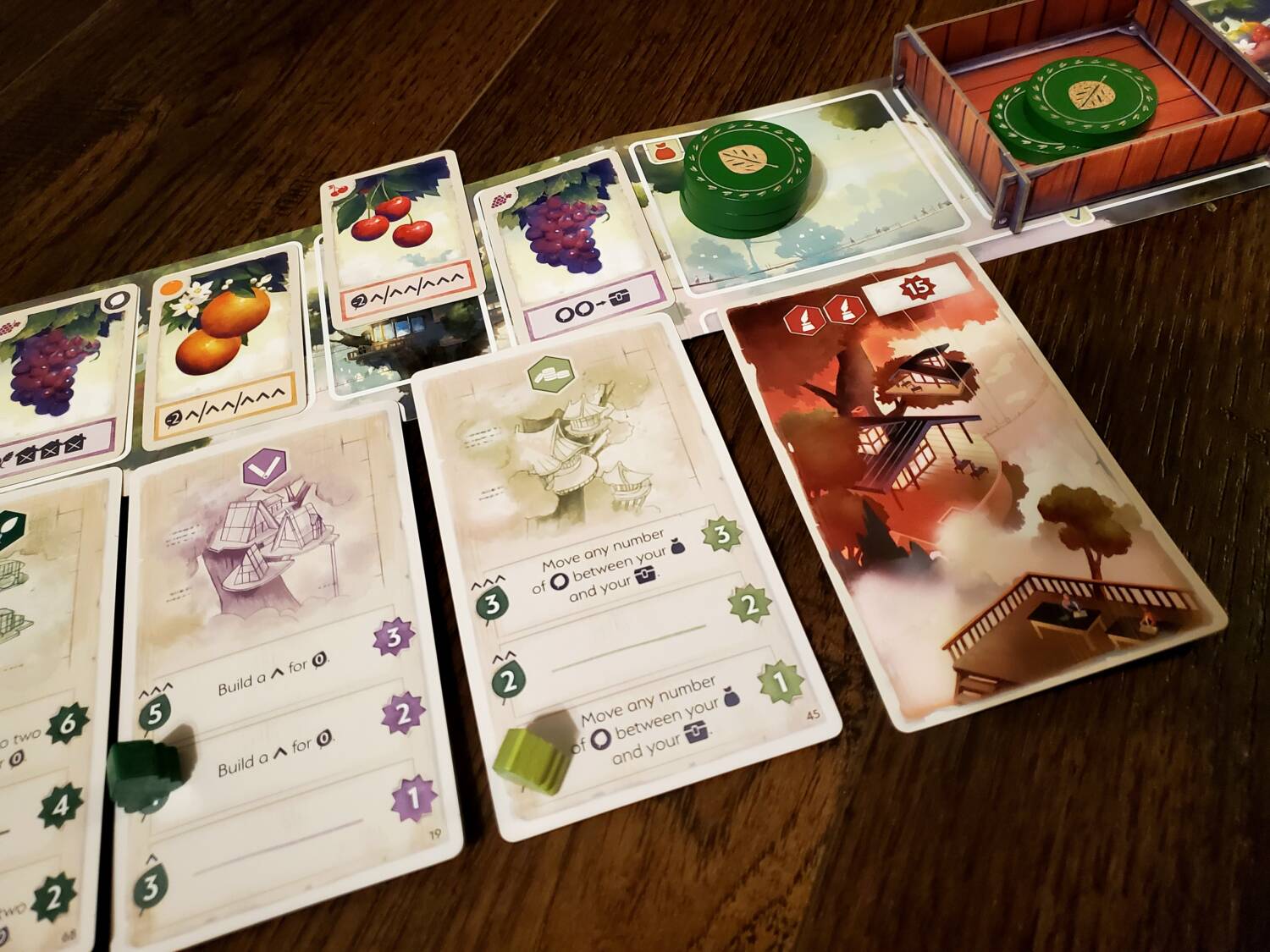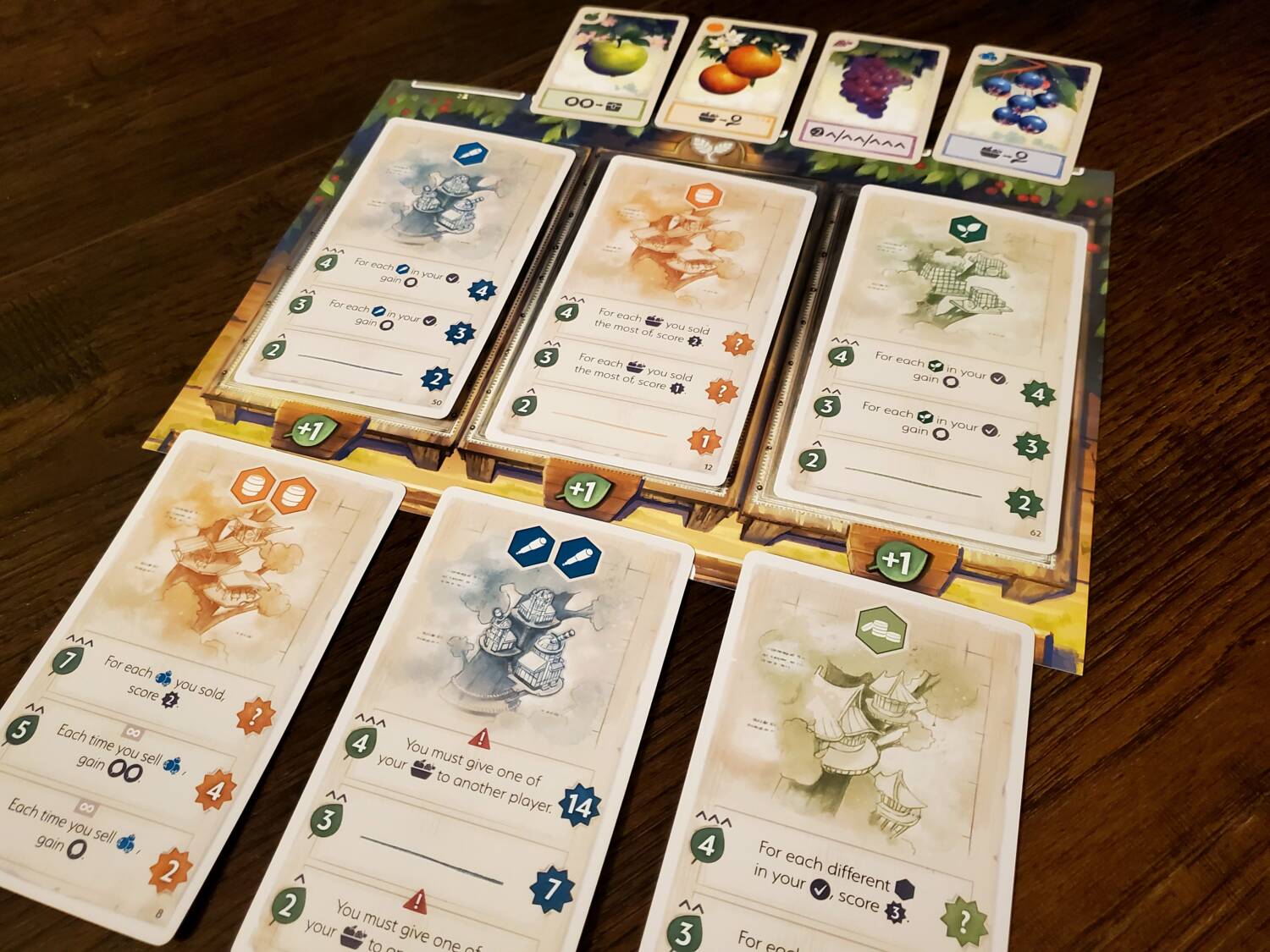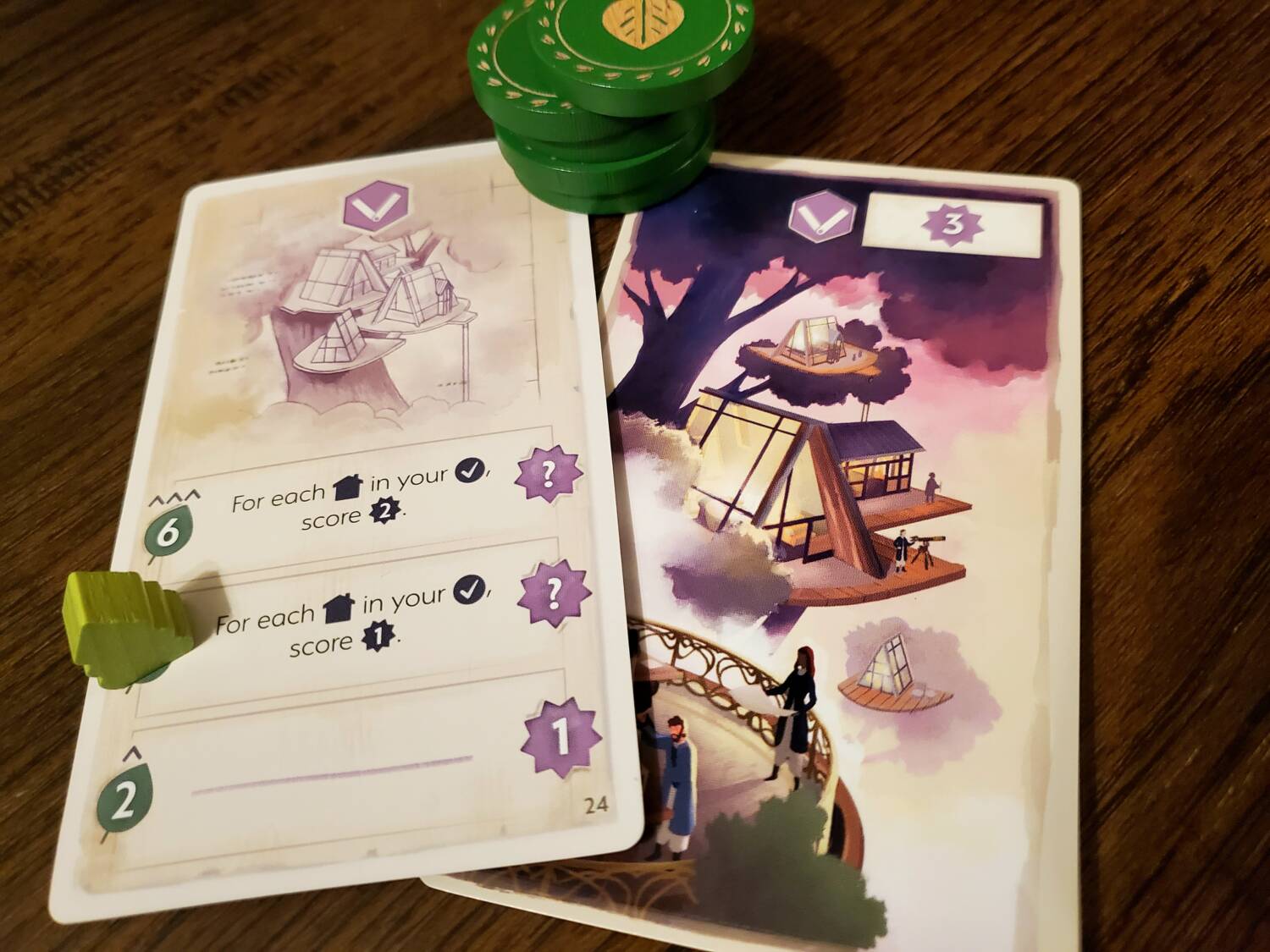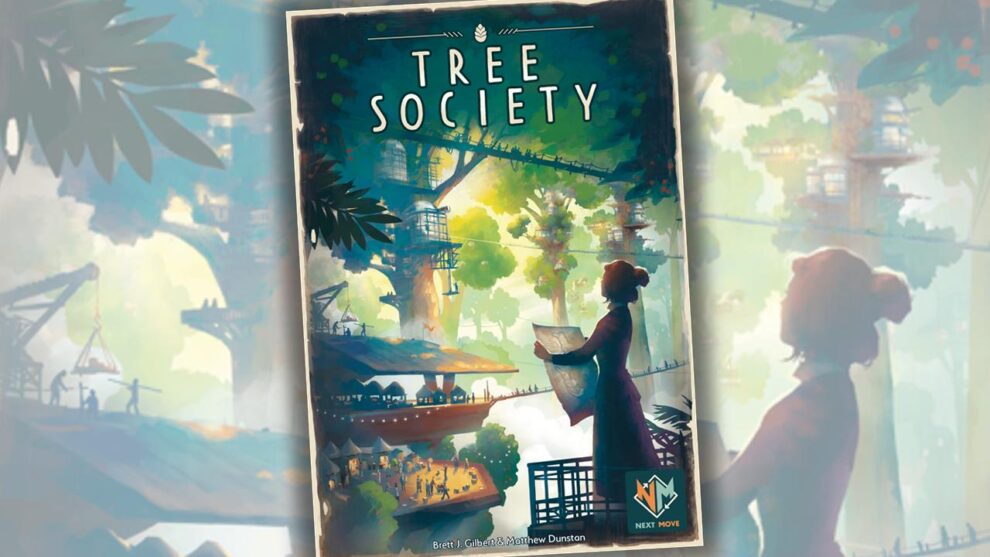Disclosure: Meeple Mountain received a free copy of this product in exchange for an honest, unbiased review. This review is not intended to be an endorsement.
“I’ll be in the kitchen. Let me know when it’s my turn.”
Downtime, in and of itself, is not a game killer—some of my favorite games feature a bit of time between turns. The game killer is when I can’t find a reason to stick around between turns. When it’s time to dole out the dessert, grab some coffee, wash the dishes, or take out the dog because I don’t feel like I even could miss anything, well now we have a problem.
Tree Society, from Matthew Dunstan and Brett J. Gilbert (The Guild of Merchant Explorers), pulled me in with a pretty box and a handful of promises. Chunky wooden coins, charming fruit cards with a quasi-steampunk color palette and illustrations, and a set of mechanics that sound interesting are a great start. But there I was, halfway through the first game, starting a conversation in the kitchen and peeking back to the table periodically to see if I needed to care yet.
I wish I could say subsequent plays were better, but I just never came around on this one. That’s not to say it’s without merit, but you might need a second game at the table, or a Sudoku book, to keep your mind occupied. Allow me to explain.
Trees, you say?
Players begin by selecting one of their fruit cards and collecting one coin for every instance of that card on the table—player stashes and fruit card market included—a genuinely interesting concept. The bottom of the selected card has an ability that can then be triggered at any point during the turn. The remaining moments pass by spending as many coins as possible on Guild cards.
Guild cards are supposed to represent some faction or aspect of tree living. In practice, however, they are theme-averse individual tracks of abilities with points to unlock by spending those chunky coins. Players purchase the cards using the base price, then upgrade according to the listed costs. Each card contains a string of bonuses, abilities, or points that can chain together in engine-like fashion, carrying along the action. Track progress is marked by a wooden tree until the card is topped off and flipped over.

Those Guild cards also have a progressive endgame value, with the top level scoring reiterated on the card back after flipping (for reference). In this way players are always measuring, always evaluating, always planning the best combination of points and powers until the final turn. Once any player reaches six of the Guild icons on flipped cards, the end is nigh. Most cards have one icon, but some have two, so the last shoe can drop quite suddenly.
In terms of gameplay narrative, Tree Society really is this simple. The fruit card decisions rest somewhere between the want of coins and abilities—weighted, of course, by the number of that card visible on the table. The Guild card decisions mirror this blend of affordability and desirability with points and powers. Beyond that, this feigned forest society is a race to collect and achieve the most lucrative set of icons before the end arrives.
Pickin’ some fruit
The fruit mechanism, though interesting, is wholly opportunistic and arbitrary. The market doesn’t allow for any sort of intentionality. If you hoard one fruit, you’re just setting up another player who lucked into a single, matching card. If everyone aims for a balanced set of fruits, high-yield turns are left to the whims and randomness of the market deck. In the long run a card’s ability is more attractive than the fruit—the coins will do as the fruit will do.

Even still, the fruit decision always feels like it matters because it sets the ball rolling down a slope with little room for deviation. The spending rails are set once a fruit card slides into play. With a stock of coins in hand, there are only so many ways to spend. Though I don’t mean to oversimplify, I suspect that whether someone enjoys this mechanistic fruit play will determine whether they like the game.
The Guild cards contain a nice breadth of possibility. Five of the box’s seven available Guilds are in play during a game, leading to slight variations in the personality of the powers and scoring. The track movements are functionally appropriate, even if not particularly exciting. It’s a nice mix. It’s nice. With each play, the word that comes to mind is clean. Tree Society is a clean design—almost too clean.
Compulsively clean designs sometimes run the risk of sterility, an efficiency game with few surprises and very little adventure.
Kickin’ some dirt
Coin management is something of a weakness for Tree Society. Players keep their coins in either a 3D chest or a purse (both stationary locations on the player board) depending on the source of the coin. Chest coins are on hold until the next round. Purse coins are available immediately. While this distinction changes a coins availability, it doesn’t necessarily matter. The coins will be available when they are available, and then you make decisions.
At the end of a turn, the player purse holds a mere two coins, a looming ultimatum to spend or forfeit resources. This might be my least favorite mechanical aspect. From a design standpoint, I understand the desire to put players on edge to make the best of their marginally equipped situation—throwing importance back on the fruit mechanism. From a narrative standpoint, however, I would rather have the ability to take some sort of a pass turn, banking coins for a banger of a next round, forcing other players to wonder at my target cards, risking the possibility that a mis-timed late-game cash grab will end in disaster.

In short, I want to feel like I can make mistakes. A market that relies at all on randomness will be more enjoyable if the player has an ounce of agency in building a bankroll for the future. That agency might fast-track either feast or famine, but I’d like to get excited about something in here, regardless of the outcome. Because players must spend in plenty and in poverty, every turn ends with a similarly bland whimper, tossing a final coin out in a subpar decision because waste is shameful.
If I may paint a picture: one of the fruit card abilities involves refreshing one row of the Guild card market after collecting coins. Such cards just introduce a big fat maybe and rarely provide a best-case scenario. In our plays, we largely ignored those cards in favor of anything that produced cash. If I were allowed, though, I might keep one refresh in my back pocket to blow on a pass turn. Give me coins, shake up the market options, rattle some bones and see what happens, especially if I know there’s a card I can’t afford, one that my neighbor wants.
On a lesser note, while the chunky coins are fun to splash around the table, the oversized Guild cards began to warp almost instantly. The player board is a paper-thin, folded strip with a few outlines for cards. I’m not entirely sure it’s even necessary. Likewise the market board is only marginally useful. Let’s just say there are component highs and lows.
And that downtime
The constant, slight changes in the fruit supplies and card markets demotivate planning ahead, creating that downtime problem. Obviously this is mitigated in the two-player game, but the randomized fruit market expands in that iteration, leaving the coin distribution even further dependent upon chance. The tension of that market begs more players, but more players inflate the discomfort of waiting. The occasional 10-second pass turn might alleviate some of those burdens, set up some monsters, dash some dreams, and create memories. But alas, no such provision awaits and I find myself heading for the kitchen.
With an eye to the concept, the balance of the cards, and the scoring possibilities, Tree Society really is clean. Truly. The system works for establishing outcomes. The setting and narrative may be absent, but the rules are approachable, the decision space is consistent, and the abilities and bonuses are, at times, interesting. But the recipe falls an ingredient or two short. It lacks punch. It lacks spirit.












Add Comment